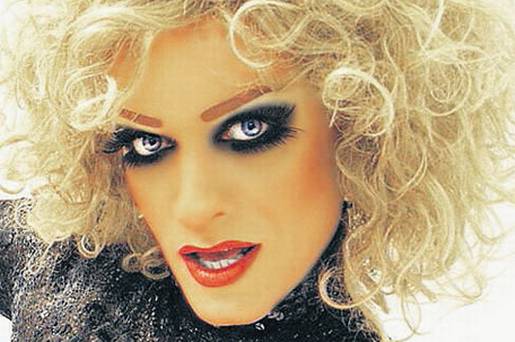Ireland’s RTE under fire for apology to Iona Institute

Rory O’Neill’s alter ego Panti
Irish state-run television broadcaster RTE has come under heavy criticism after offering a full apology and possible financial compensation to the Iona Institute, a conservative Catholic lobby groups declared “homophobic” by a talk show guest.
The decision appears to have been reached under pressure from Irish Broadcasting Authority board member John Waters, who was also declared homophobic during the same segment. The allegations follow RTE’s decision to remove the remarks, made by Rory O’Neill who performs as one of Ireland’s most acclaimed drag queens under the name Miss Panti, and extensive popular debate about the treatment of Ireland’s conservative lobby groups in mainstream media.
On RTE’s The Saturday Night Show, O’Neill declared a number of prominent Conservative advocates, specifically Breda O’Brien, John Waters, and “The Iona Institute crowd” homophobic. RTE removed the segment from its online player the following day, citing legal concerns as well as the recent murder of Iona Institute researcher Tom O’Gorman as a matter of “sensitivity”‘ although later admitting O’Gorman was not relevant to the program content. On January 25th, the show’s host Brendan O’Connor formally apologised for the distress caused to John Waters and other columnists. The Iona Institute has thanked RTE for the apology, which it called “an extremely valuable contribution to a calm and reasonable debate” and explained that RTE had also agreed to pay damages to the injured parties. When asked about the claim that damages would be paid over O’Neill’s comments, an RTE television spokesperson declined to comment. Neither side would confirm the identity of the claimants.
RTE’s sudden condemnation of the remarks has been linked to legal action pursued by John Waters, a conservative Catholic commentator and journalist, and board member of the Broadcasting Authority of Ireland . The Irish Independent cite anonymous sources confirming that legal representatives of Waters sent a legal letter to the broadcaster seeking the removal of the interview on the popular Saturday Night Show. It has since been restored to the website, though the offending portions of O’Neill’s interview have been edited out. Waters resigned from his position with the Irish Broadcasting Authority on January 23rd, after the letters had been drafted and sent. His decision to legally challenge RTE has been broadly criticized as an abuse of office. As solicitor Simon McGarr explains, this “was not merely a letter from an aggrieved citizen to a broadcaster. It was also a letter from one of that Broadcaster’s regulators seeking to have that broadcaster censor a citizen, who was both contributing to a matter of public debate and engaging in a defence of a minority of which he is a member, bona fide and without malice”. Waters has declined all requests for media comment.
Since his appearance on The Saturday Night Show, O’Neill has confirmed receiving personal legal correspondence from Breda O’Brien, David Quinn, Patricia Casey, and John Murray, all patrons of the Iona Institute. In a statement released on its blog, the Iona Institute defended the measure, explaining: “The problem is that merely believing that marriage is the sexual union of a man and a woman, and that children deserve the love of both a mother and a father whenever possible is automatically deemed to be ‘homophobic’ by those wishing to close down this debate.” This defamation, they claim, is harmful to political discussion.
Any private claims of defamation, explains barrister Brian Barrington, are unlikely to hold up in court, explaining: “Mr O’Neill’s comments arise in a context where the Iona Institute is well known in Ireland for its opposition to affording equal marriage rights to gays and lesbians and also for its opposition to same-sex parenting. It seeks to maintain the current discrimination whereby same-sex couples are prohibited from marrying whereas opposite sex couples are free to do so. In these circumstances, it is clear that Mr O’Neill was entirely entitled to express his honestly held opinion, which was based on facts that were reasonably known to the public.” Criticism of RTE for reacting to such a baseless legal case is well founded. “‘It is astonishing that RTE, a national broadcaster, should apologise for what Mr O’Neill has stated, censor his interview on the internet and award public money to those in the Iona Institute who have sought to prevent a free debate on equal marriage by preventing gay rights campaigners from uttering in future that opposition to same sex marriage is homophobic,” he explains.
Irish media have come under fire for a number of complaints of homophobia in recent weeks, including a discussion on RTE radio program The God Slot that discussed “curing” homosexuality and a Midwest Radio presenter’s decision to read a text on air that suggested children of gay couples could develop Aids. Ireland will legislate on a number of key gay rights issues in the coming years, including full legal recognition of gay adoptive parents, and a constitutional referendum on the legalisation of gay marriage is scheduled for 2015. The imminent debate has many calling for a “homophobia watchdog” to monitor public statements.
Una Mullally, a columnist for the Irish Times, explains: “‘Free speech’ is not a free pass to inflict psychological trauma just because you don’t want lesbians or gay people to get married. Opponents of marriage equality are not the victims in this debate.”
This article was posted on 30 January 2014 at indexoncensorship.org
